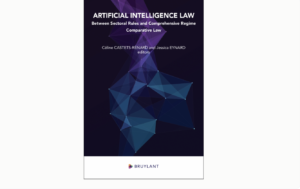New book: “AI Law – Between Sectoral Rules and Comprehensive Regime”

Artificial intelligence (AI) has undoubtedly become one of the most transformative technologies in recent years. As its capabilities continue to evolve, so do the legal implications surrounding its use. To shed light on this complex and ever-changing field, a newly published book on AI Law titled AI Law – Between Sectoral Rules and Comprehensive Regime has been released, with Prof. Jessica Eynard, an associate professor at the LeADS beneficiary University of Toulouse, serving as its co-editor.
Bringing together a diverse group of forty authors from various corners of the globe, this book delves into the recent legislative advancements in their respective jurisdictions within the emerging field of AI law. By exploring the rapidly evolving landscape of AI legislation, the book aims to compare normative approaches while considering the social, cultural, historical, and legal system differences that may exist between different countries. The contributors to the book hail from countries such as Canada, France, Belgium, the United States, Brazil, Mexico, and Senegal, ensuring a wide range of perspectives and experiences are represented. By including authors from such diverse backgrounds, it becomes possible to evaluate and analyze the different approaches taken by each jurisdiction in addressing the legal challenges posed by AI.
The book aims to provide readers with a comprehensive overview of the current state of AI law globally, allowing for an understanding of the similarities, disparities, and gaps that exist between different jurisdictions. By examining these legislative advancements, researchers, policymakers, and legal professionals can gain insights into the challenges faced by various countries and identify potential best practices or areas for improvement.
More information is available on this website.





